Soaring Records in NASA & NOAA’s 2023 Global Global Temperature Report
Soaring Records in NASA & NOAA’s 2023 Global Temperature Report
On Friday, Jan. 12 at 11 a.m. EST, NASA and NOAA will release the 2023 assessment of global temperatures. Click HERE for more information about the media briefing.
2023 was one for the record books with the hottest summer on record in the Northern Hemisphere and the warmest winter on record for the Southern Hemisphere. Last year also had 25 confirmed disaster events as of Dec. 9, that resulted in more than $1 billion in damages for each event in the United States alone. Southern California saw its first-ever tropical storm watch in August. Smoke from Canadian wildfires turned the skies in New York City orange and triggered air quality alerts along the East Coast. The Midwest experienced devastating flooding and a string of deadly tornadoes that claimed five lives. In a summer marked by extraordinary heat in the Southwest, Phoenix had 31 consecutive days of temperature above 110 degrees in July. Elsewhere in the world, record-breaking Tropical Cyclone Freddy became the longest-lived cyclone in history devastating parts of Madagascar and Mozambique with deadly flooding and landslides.
Talk about this record year and what it means with a NASA or NOAA expert.
Live interviews with NASA and NOAA experts are available January 12, 2024 from 12 p.m.- 5 p.m. EST
Click here to request an interview: https://forms.gle/SKBTcfHfAWd23gCE6
Requests sent via the above form will have scheduling priority. Please do not email requests.
*Graphics/records showing 2023 global temperature trends can be found here:
https://svs.gsfc.nasa.gov/5207/
https://svs.gsfc.nasa.gov/5190/
Phttps://svs.gsfc.nasa.gov/5191/
Learn more at https://www.nasa.gov/ and on social media @NASA
Suggested Anchor Intro:
2023 was a year of weather extremes across the planet from the hottest summer on record to Hurricane Idalia that caused vast damage across Florida and the southwestern U.S. Health hazards from the massive wildfires in Canada reached vast regions of the U.S. that don’t normally see impacts from the smoky fire season. Here in OUR region we experienced ……
Let’s find out how 2023 ranked in the books with NASA (or NOAA) climate expert XXX, here to give us a 2023 climate breakdown.
Suggested Questions:
1. NASA and NOAA just announced the latest global temperature data for 2023, where does 2023 rank in the climate record?
2. In 2023 we saw a lot of extreme events. What impacts from climate change can we expect in our region? Pick a general area.
West Coast
Midwest
East Coast
International
3. What upcoming Earth science missions are you most excited about?
4. What action steps are NASA/NOAA taking to address climate issues?
5. Where can viewers learn more about today’s announcement, and what it means for our area?
Questions for longer interviews:
6. We’re currently in a strong El Niño. Can you explain what El Niño is and how it impacts global temperatures?
7. NASA is preparing to launch a new satellite - the Plankton, Aerosol, Cloud Ocean Ecosystem or PACE - in just a few weeks that will shed new light on the health of our atmosphere and oceans. What are you most excited about with this mission?
8. According to NOAA’s annual climate and weather disaster report, 2023 was a costly one. Can you tell us more about this report and how it differs from other years?
9. Given how extraordinary 2023 was, what does that tell you about future trends?
10. The Northeast just experienced its first major winter storm in two years. Does that mean this year might be off to a cooler start than last year?

NEWEST GRAPHICS FOR FRIDAY, JAN 12 ANNOUNCEMENT CAN BE FOUND HERE!!! *Graphics/records showing 2023 global temperature trends can be found here: https://svs.gsfc.nasa.gov/5207/ Click here for Friday, Jan 12's release: Five Factors to Explain the Record Heat in 2023 Click here for more information about the media briefing on Friday, Jan 12 at 11 a.m. EST: NASA, NOAA to Announce 2023 Global Temperatures, Climate Conditions Associated cut b-roll for the live shots and pre-recorded soundbites will be added by 4 p.m. EST on Thursday, Jan 11. Graphics/records showing 2023 global temperature trends are embargoed until Friday, Jan. 12 at 11:00 a.m., our resources will be updated at that time
The NASA climate spiral visualization with labels in English and Celsius.
Pre-recorded soundbites with NASA Chief Scientist Dr Kate Calvin. TRT 4:00. Full transcript available under the download button
Resource reel for 2023 Temperature Liveshots including:
- Severe weather over the U.S.
- Smoke from Canadian wildfires
- Hurricane Idalia
- Drought on the Rio Negro in the Amazon basin
- Storm Daniel in the Mediterranean
- Global precipitation
- Simulated data from NASA's upcoming PACE mission
- NASA's current orbital fleet
- Model views of methane and carbon dioxide
- US Crop distributions as estimated by Landsat
- Footage from NASA's Firesense mission
- Links to learn more
Pre-recorded soundbites with NASA Administrator Bill Nelson on the 2023 global temperature record. TRT 1:21. Transcript available under the download button
Pre-recorded soundbites with NASA Chief Scientist Kate Calvin on the 2023 global temperature report. TRT 1:08
Pre-recorded soundbites with NASA Administrator Bill Nelson. TRT 4:23. Full transcript is available under the download button.
For More Information
Credits
Please give credit for this item to:
NASA's Goddard Space Flight Center
-
Technical support
- Aaron E. Lepsch (ADNET Systems, Inc.)
-
Producers
- Christina Brooke Mitchell (eMITS)
- Michelle Handleman (eMITS)
- Jefferson Beck (eMITS)
- Angel Kumari (NASA/GSFC)
Series
This page can be found in the following series:Release date
This page was originally published on Tuesday, January 9, 2024.
This page was last updated on Friday, January 12, 2024 at 11:35 AM EST.
